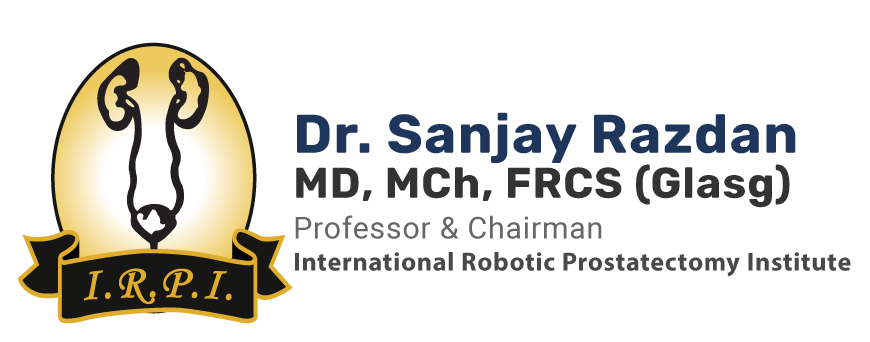International Robotic Prostatectomy Institute
 Prostate Cancer Expert
Prostate Cancer Expert
 Robotic Prostate Surgery
Robotic Prostate Surgery
 Prostate Cancer Treatment
Prostate Cancer Treatment
 Robotic Surgery
Robotic Surgery
 MRI Fusion Prostate Biopsy
MRI Fusion Prostate Biopsy
 Robotic Prostatectomy
Robotic Prostatectomy

Dr. Sanjay Razdan MD, MCh, FRCS (Glasg)
Dear Colleagues,
In this month’s newsletter, we would like to remind you that here at the Miami Robotic Prostatectomy Institute we are the leaders in Prostate Cancer Surgery. It is critical that male patients continue to have regular prostate exams by their Urologist or Primary Care physician. Over 230,000 men are diagnosed with Prostate Cancer every year and over 30,000 dying annually in the United States.
Even with advanced techniques and innovation to detect cancer and the myriad of new treatment options available, we still need to test and detect prostate cancer early. If prostate cancer is detected early, THERE IS A CURE. Now for over 18 years I have been treating prostate cancer patients here in South Florida. I take great pride in having one of not only having the highest volumes (now over 8,500 robotic procedures) but the highest success rate in terms of eliminating the cancer, keeping patients continent and resuing normal sexual function immediately after Prostate Cancer Surgery.
We here at the International Robotic Prostatectomy Institute are always ready to help your patients diagnosed with prostate cancer. Contact our office and we can assure you an appointment within 24-48 hours. You can feel confident your patients are in the best hands and we encourage you to visit and view over 450 video testimonials from patients around the world.
- First in the World Grading Scale on Nerve Preservation
- The most Prostate Cancer Testimonials in the World
- Radiation Therapy VS Prostatectomy
Thank you for taking the time to read this email. We hope you find this information useful. Remember, if you need us, we are always one phone call away!
Cordially yours,
Dr. Sanjay Razdan MD, MCh, FRCS (Glasg)
Urologic Oncologist & Robotic Surgeon
Featured

Robotic Inguinal Hernia Repair
Less Pain with a smaller incision! Thanks to innovations in robotic technology from Intuitive Surgical, Dr. Razdan is able to perform robotic inguinal hernia repair through tiny incisions rather than the large incisions associated with traditional open surgery. The result is less damage to surrounding tissues, less pain for the patient and a much quicker recovery—often within days.
Robotic surgery techniques have been used for years to provide advanced treatment for urologic conditions. Now, Dr. Sanjay Razdan applies the same technology to other types of procedures, including hernia repair.

What is Benign Prostatic Hyperplasia?
Benign Prostatic Hyperplasia, better known as BPH, is a enlargement of the prostate gland (non-cancerous) due to an over development of prostate cells. The gland is a critical component of the male reproductive system.
The prostate gland secretes a fluid into the urethra during the ejaculation process. The prostate gland is located below the neck of the urinary bladder, encompassing the urethra. Although there is no consensus on the cause of BPH many experts believe it is caused due a decrease in testosterone as a man ages.
Nearly 50% of men at age 50 will have Benign Prostatic Hyperplasia, and by the time reach 80 years of age, there is an 80-90% chance of developing an enlarged prostate. In the US, more then 2 million men are treated annually for BPH. While symptoms of BPH and prostate cancer are similar, Benign Prostatic Hyperplasia has never been proven to be a precursor in developing prostate cancer.

Nerve Sparing Robotic Prostatectomy - the advantages
Nerve-sparing robotic prostatectomy by Dr. Razdan provides cancer patients with a safe and minimally invasive technique for removal of the prostate gland. Robotic prostatectomy has many benefits. The high tech equipment used to accomplish this surgery allows the surgeon to operate through small ports while visualizing internal organs in high definition. Nerve-sparing robotic prostatectomy allows surgeons to operate with the same flexibility and ease as an open surgeon has when performing open prostatectomy. This approach has some key benefits that include:

Copyright © 2020 All Rights Reserved
Dr. Sanjay Razdan, MD, MCh, FRCS (Glasg)
3650 N.W. 82nd Avenue Suite, PH 501
Miami, FL 33166
Disclaimer
The information you obtain in this newsletter is not, nor is it intended to be medical advice. You should consult an doctor for advice regarding your individual situation. We invite you to contact us and welcome your calls, letters, and electronic mail. Contacting us does not create an doctor-patient relationship. Please do not send any patient information to us until such time as an doctor-patient relationship has been established.
 (305) 251-8650
(305) 251-8650  Visit our Website
Visit our Website Email Us
Email Us


